I’m writing this from Dnipro Hotel, Kyiv, Ukraine. It’s an old monstrous Eastern European hotel with long corridors, blue old carpet, old wooden armchairs, and an imposing white grand piano when the elevator doors open on the 11th floor. When I stand at my window I can see the meandering silver ribbon of the Dnieper River and Independence Square further north. The hotel smells of complicated revolutions and long-bearded white men pointing at each other with their pipes.
A few hundred kilometres northeast a war with Russia rages on. Men kill men in ditches.
I know what you are thinking about (apart from the blue carpet): How did I end up here?
To answer this question we have to go back to a night in 2009 at Malindi police station.
It was a warm night, as Malindi nights tend to be. I was on an assignment that I now forget. I had a photographer with me, some unpredictable bloke called Elvis who had a penchant for a short fuse and a longer history with alcohol. At a club we had gone to blow off steam, some guy had bumped into him and he had asked the guy, “What?” The guy said, “What?” He said, “What?” the language of testosterone. A brawl ensued which spilled out in the streets. Cops were called and he was thrown in the back of a van and hauled off to the coolers. I followed him there to try and get him out because we don’t leave a man behind. At the cop station, I met Rosemary who was there because of some other matters. I don’t remember the details. It was a brief interaction and I never heard from her again. Two months ago I was in shags seated under a tree on a very hot afternoon when someone called saying he had been given my number by a Rosemary. “I’m calling on behalf of Journalists for Justice,” the gentleman said. “Would you like to be part of the team that travels to Ukraine?”
“Of course,” I said because this is the year of (some) yeses. I had a blade of grass in my mouth. I was watching my Guinefolws forage in the rock garden wondering, “What do guinea fowl taste like?”. Victor, Lady’s brother, who was visiting from Ireland said, “Did I hear you say you are going to Ukraine?” I said yes.
“Are they not at war?” Lady was alarmed.
“Yes.” I shrugged. “Probably tastes like overnight chicken sausage”, I thought, looking at the guinea fowls.
So here I am.
I’m not going to get into an account of how difficult it is to get a visa to a country at war. And since you can’t fly directly to Ukraine, you have to get another Visa from the Poles. It involved a lot of calls to the embassy, postponements, more calls, and finally, I was in Warsaw on a warm summer morning.
Some highlights.
DAY ONE.
[1/08/2024]
 We drove for six and a half hours to Lviv, a city in Western Ukraine. (The first ‘v’ is silent). Lviv is charming. Cobblestone streets, old churches, and buildings dating back 13 centuries. The architectural style is baroque and classical. They loom large with history and status. We checked into a cosy little boutique hotel near a historical market square in the Old Town. I felt like a character in a book who had tied his horse outside and was going to spend the night in a room with a creaking wooden floor, only the floor wasn’t wooden.
Most hotels will show you where the safe is and how the AC works. In Lviv, we were told, “If you hear an air raid siren at night you run to the bomb shelter immediately.” It sounds much scarier if you hear this in a Ukrainian accent. We were shown the bomb shelter. The roof was from the 12 Century. Our host also assisted us in downloading an app that monitors the air raid, giving warnings and what kind of missile or drones the Russians have launched. The app also predicts the level of danger and how long the weapon will take before it falls on your bed if the Ukrainian army does not intercept it with their air defence missile. We were also handed SIM cards that have unlimited data. All Ukranians have these SIM cards with Unlimited data on their phones.
We drove for six and a half hours to Lviv, a city in Western Ukraine. (The first ‘v’ is silent). Lviv is charming. Cobblestone streets, old churches, and buildings dating back 13 centuries. The architectural style is baroque and classical. They loom large with history and status. We checked into a cosy little boutique hotel near a historical market square in the Old Town. I felt like a character in a book who had tied his horse outside and was going to spend the night in a room with a creaking wooden floor, only the floor wasn’t wooden.
Most hotels will show you where the safe is and how the AC works. In Lviv, we were told, “If you hear an air raid siren at night you run to the bomb shelter immediately.” It sounds much scarier if you hear this in a Ukrainian accent. We were shown the bomb shelter. The roof was from the 12 Century. Our host also assisted us in downloading an app that monitors the air raid, giving warnings and what kind of missile or drones the Russians have launched. The app also predicts the level of danger and how long the weapon will take before it falls on your bed if the Ukrainian army does not intercept it with their air defence missile. We were also handed SIM cards that have unlimited data. All Ukranians have these SIM cards with Unlimited data on their phones.
 Up in my room, I threw open the windows and stared out. The feeling of living in a different time was stronger looking out at the old buildings. I looked down at the Ukranians walking by the cobblestones. Some with dogs on leashes. Others holding hands. The women are birdlike; and svelte. Their wrists are like little twigs that can snap in a strong wind. The men are mostly stout and portly and a little bowlegged. And they walk fast. Ukrainians seem to walk fast, like New Yorkers. Maybe it’s because of the war. For New Yorkers it’s because they don’t want anyone to stop them and ask them for directions. They couldn’t bear to remove their earphones and have a conversation with another human being.
Anyway, I’m standing at my window, looking down, Nobody looks up. Had I any complimentary nuts in my room I would have tossed one on the heads of passersby just for shits and giggles.
Up in my room, I threw open the windows and stared out. The feeling of living in a different time was stronger looking out at the old buildings. I looked down at the Ukranians walking by the cobblestones. Some with dogs on leashes. Others holding hands. The women are birdlike; and svelte. Their wrists are like little twigs that can snap in a strong wind. The men are mostly stout and portly and a little bowlegged. And they walk fast. Ukrainians seem to walk fast, like New Yorkers. Maybe it’s because of the war. For New Yorkers it’s because they don’t want anyone to stop them and ask them for directions. They couldn’t bear to remove their earphones and have a conversation with another human being.
Anyway, I’m standing at my window, looking down, Nobody looks up. Had I any complimentary nuts in my room I would have tossed one on the heads of passersby just for shits and giggles.
 Dinner was at an amazing place called Para Janov and Portwine along Lesya Ukrainky Street, 12. It was like eating in a very fancy cave. Outside in the streets, people sat at tables drinking wine and looking very glamorous. You couldn’t tell that only a month ago, in Central Kyiv, the Russians had bombed Okhmatdyt Children’s Hospital, the largest paediatric clinic in the country that treats cancer and organ transplant patients.
Yeah, if Putin can bomb clean-shaven cancer children, he would have no qualms at all about bombing our hotel, I thought as I settled in for the night. Funny enough, I didn’t think about death. I haven’t thought about my death the whole time I have been here. It seems futile. It’s like thinking about Eva Mendes. What’s that going to accomplish?
DAY TWO
I woke up and had a little irritating back-and-forth with Tamms. They have a compulsory school boot camp to help them prepare for their final exams next year. They gave parents the option to either have them board or be day scholars for the two weeks. She wanted to be a day scholar, obviously. To be picked and dropped. It takes me close to an hour to drive to her school. “Who will do that drive in the morning and evening?” I asked her. “Also, I am away till next Friday.”
“Some of my friends will be picked and dropped.” She wrote back.
I didn’t know what that meant. It irked me because how do I know where their parents live? Or what do they do? Maybe they have drivers. I don’t. I’m the driver.
I don’t know if it meant that I was failing her.
Ignored that comment and wrote. “Besides, have you thought of how interrupting that is, not only for you but for me? Not to mention time-consuming and expensive?”
I lay in bed waiting for her to start typing but she never did. She ghosted me. That conversation was done for her. She does that sometimes; just ignore me. Also, I’m the only one she chats with on WhatsApp, the app for old people, so going on WhatsApp must feel like sending a message via a pigeon. I knew she was mad but what was I to do, I was at war for chrissake.
Rather, I was in a war zone.
Kind of.
So I started my day.
Dinner was at an amazing place called Para Janov and Portwine along Lesya Ukrainky Street, 12. It was like eating in a very fancy cave. Outside in the streets, people sat at tables drinking wine and looking very glamorous. You couldn’t tell that only a month ago, in Central Kyiv, the Russians had bombed Okhmatdyt Children’s Hospital, the largest paediatric clinic in the country that treats cancer and organ transplant patients.
Yeah, if Putin can bomb clean-shaven cancer children, he would have no qualms at all about bombing our hotel, I thought as I settled in for the night. Funny enough, I didn’t think about death. I haven’t thought about my death the whole time I have been here. It seems futile. It’s like thinking about Eva Mendes. What’s that going to accomplish?
DAY TWO
I woke up and had a little irritating back-and-forth with Tamms. They have a compulsory school boot camp to help them prepare for their final exams next year. They gave parents the option to either have them board or be day scholars for the two weeks. She wanted to be a day scholar, obviously. To be picked and dropped. It takes me close to an hour to drive to her school. “Who will do that drive in the morning and evening?” I asked her. “Also, I am away till next Friday.”
“Some of my friends will be picked and dropped.” She wrote back.
I didn’t know what that meant. It irked me because how do I know where their parents live? Or what do they do? Maybe they have drivers. I don’t. I’m the driver.
I don’t know if it meant that I was failing her.
Ignored that comment and wrote. “Besides, have you thought of how interrupting that is, not only for you but for me? Not to mention time-consuming and expensive?”
I lay in bed waiting for her to start typing but she never did. She ghosted me. That conversation was done for her. She does that sometimes; just ignore me. Also, I’m the only one she chats with on WhatsApp, the app for old people, so going on WhatsApp must feel like sending a message via a pigeon. I knew she was mad but what was I to do, I was at war for chrissake.
Rather, I was in a war zone.
Kind of.
So I started my day.
 We visited the Superhumans Center. A modern center for prosthetics, reconstructive surgery, and rehabilitation for war victims. Lots of men – and some women – shuffling about with prosthetic limbs. Men with a missing hand. Men with two missing hands. Men with a missing hand and a missing leg. Men with two missing legs and two missing hands. Men who stepped on landmines or had their vehicles blown up in the frontline. Men with shrapnel still lodged in them. Men who have come from the horrors of war, the precipice of death. They sit outside with blank stares, smoking or drinking energy drinks. Some have tattoos on their necks. Or on their good legs. So far the clinic has had 650 patients pass through and attached some 750 prosthetic limbs. There are about 600 still on the waiting list. We were shown their gym where we saw men struggling to walk again. They looked like babies learning to walk. They fell and got up. They stumbled. They leaned on rails. They sweated. Grimaced. It felt intrusive to look at them at their most vulnerable moment. The facility had 70 beds with inpatients.
We visited the Superhumans Center. A modern center for prosthetics, reconstructive surgery, and rehabilitation for war victims. Lots of men – and some women – shuffling about with prosthetic limbs. Men with a missing hand. Men with two missing hands. Men with a missing hand and a missing leg. Men with two missing legs and two missing hands. Men who stepped on landmines or had their vehicles blown up in the frontline. Men with shrapnel still lodged in them. Men who have come from the horrors of war, the precipice of death. They sit outside with blank stares, smoking or drinking energy drinks. Some have tattoos on their necks. Or on their good legs. So far the clinic has had 650 patients pass through and attached some 750 prosthetic limbs. There are about 600 still on the waiting list. We were shown their gym where we saw men struggling to walk again. They looked like babies learning to walk. They fell and got up. They stumbled. They leaned on rails. They sweated. Grimaced. It felt intrusive to look at them at their most vulnerable moment. The facility had 70 beds with inpatients.
 That’s Petro Buryak. His car was blown by a landmine in the front line. You can read his interview on my social media.
That’s Petro Buryak. His car was blown by a landmine in the front line. You can read his interview on my social media.

 We had lunch somewhere really nice. We have been eating in some decent places. There are lots of bread and salads for starters, exotic meals. Breakfasts in the hotel, on the other hand, should be categorised under war crimes. Cold cuts, bread that can be used as a scalpel, and sausages that taste like old curtains.
There was a meeting with Maksym Kozytskyi, the head of Lviv Regional Military Administration. The newsy journalists from other African countries engaged him. I sat there wondering if Tamms was still mad at me. I remembered something she told me one day: “I can’t wait to turn 18 so that I can have my freedom and go out.” I laughed loudly, genuinely. I said, “Oh you will be so bored of it you won’t go anywhere.”
That made me smile.
There was a planned tour of the city at night but I skipped it. I was too wiped. Also, groups tire me: Moving in groups. Doing things in groups. Talking in groups. Besides, I couldn’t wait to go back to the room and read. I’m reading Erasure, by Percival Everett. Fantastic prose.
We had lunch somewhere really nice. We have been eating in some decent places. There are lots of bread and salads for starters, exotic meals. Breakfasts in the hotel, on the other hand, should be categorised under war crimes. Cold cuts, bread that can be used as a scalpel, and sausages that taste like old curtains.
There was a meeting with Maksym Kozytskyi, the head of Lviv Regional Military Administration. The newsy journalists from other African countries engaged him. I sat there wondering if Tamms was still mad at me. I remembered something she told me one day: “I can’t wait to turn 18 so that I can have my freedom and go out.” I laughed loudly, genuinely. I said, “Oh you will be so bored of it you won’t go anywhere.”
That made me smile.
There was a planned tour of the city at night but I skipped it. I was too wiped. Also, groups tire me: Moving in groups. Doing things in groups. Talking in groups. Besides, I couldn’t wait to go back to the room and read. I’m reading Erasure, by Percival Everett. Fantastic prose.
 My room had a bathtub. I thought, rather preciously, that I’d try soaking in there with a book like I see people do in movies after a long hard day in the trenches. (Excuse that pun). So I filled the tub slipped in with my book and tried to read. I was distracted though; The tub kept making gurgling sounds. Second, I was afraid my Kindle would accidentally fall into the water. And how the hell do women read in the bathtub? I started getting weak in there, tired. Like the water was draining me. So I quit and went to bed and prayed there would be no air raid siren at night.
DAY THREE.
Kyiv.
My room had a bathtub. I thought, rather preciously, that I’d try soaking in there with a book like I see people do in movies after a long hard day in the trenches. (Excuse that pun). So I filled the tub slipped in with my book and tried to read. I was distracted though; The tub kept making gurgling sounds. Second, I was afraid my Kindle would accidentally fall into the water. And how the hell do women read in the bathtub? I started getting weak in there, tired. Like the water was draining me. So I quit and went to bed and prayed there would be no air raid siren at night.
DAY THREE.
Kyiv.
 We drove about six hours North Central of Ukraine. It rained the whole way. Kyiv is a surprise. It’s modern. It’s vibrant. It’s a typical European city; No sign of war or an “uneasy calm,” someone mentioned. Russia’s assault on power grids and transmission lines in the last couple of months has plunged the city into daily blackouts for up to 12 hours. We didn’t experience the blackouts, though.
We spent the whole day in some interviews with academics and bureaucrats. We toured the city, crossing streets at right angles. Saw destroyed Russian military hardware from the first invasion in 2022. I touched the snout of a tank, the mouth of death, the messenger of evil.
Took some dope photos.
We drove about six hours North Central of Ukraine. It rained the whole way. Kyiv is a surprise. It’s modern. It’s vibrant. It’s a typical European city; No sign of war or an “uneasy calm,” someone mentioned. Russia’s assault on power grids and transmission lines in the last couple of months has plunged the city into daily blackouts for up to 12 hours. We didn’t experience the blackouts, though.
We spent the whole day in some interviews with academics and bureaucrats. We toured the city, crossing streets at right angles. Saw destroyed Russian military hardware from the first invasion in 2022. I touched the snout of a tank, the mouth of death, the messenger of evil.
Took some dope photos.





 DAY FOUR.
Tamms texted me to say she was off to school. The text was as warm as a Russian’s heart.
We drove to Moschun.
You might have heard of the Battle of Moschun. It has been described as one of the fiercest and most important battles during the defense of Kyiv when the Russians first invaded Ukraine in March 2022. If the Russians took Moschun, they would then take Kyiv in a matter of hours. So the Kremlin sent one of his most elite fighters with their most modern equipment.
DAY FOUR.
Tamms texted me to say she was off to school. The text was as warm as a Russian’s heart.
We drove to Moschun.
You might have heard of the Battle of Moschun. It has been described as one of the fiercest and most important battles during the defense of Kyiv when the Russians first invaded Ukraine in March 2022. If the Russians took Moschun, they would then take Kyiv in a matter of hours. So the Kremlin sent one of his most elite fighters with their most modern equipment.
 They met great resistance that they hadn’t anticipated. First, they couldn’t cross the River Irpin because a dam called Kozorovitsky had been blown by Ukrainian National Guards and special forces creating a natural barrier. They had also shown up with outdated maps, so when they got to Moshchun they were like, “Nikolai, this map says right here that there would be a road here.”
“There was. There is. I…what map is this you got, Boris?”
“The map we were given, what do you mean?!”
“But here it says this map is from 1944!”
“Are you kidding me?”
Meanwhile, the whole village of Boshchun led by the man whose picture you see here, the mayor of Moschun, was out in the streets, turning street signages to confuse the Russians. Children and women were out digging trenches and making Molotov bombs. The small village of 1,500 people was out defending their turf. The fight lasted a month before the Russians retreated.
They met great resistance that they hadn’t anticipated. First, they couldn’t cross the River Irpin because a dam called Kozorovitsky had been blown by Ukrainian National Guards and special forces creating a natural barrier. They had also shown up with outdated maps, so when they got to Moshchun they were like, “Nikolai, this map says right here that there would be a road here.”
“There was. There is. I…what map is this you got, Boris?”
“The map we were given, what do you mean?!”
“But here it says this map is from 1944!”
“Are you kidding me?”
Meanwhile, the whole village of Boshchun led by the man whose picture you see here, the mayor of Moschun, was out in the streets, turning street signages to confuse the Russians. Children and women were out digging trenches and making Molotov bombs. The small village of 1,500 people was out defending their turf. The fight lasted a month before the Russians retreated.
 The Mayor of Moschun, who once fought for the soviet army in the Balkans when his country was still under the soviet union, says whenever he hears choppers now, he gets scared. “I can’t sleep the whole night when I hear the sound of choppers.” His two sons are out fighting on the front lines. I asked him if that made him anxious, that they might not come back home. “Are there other sons of other men in this war who might not come home?” he posed. “Imagine if all we thought about was the safety of our sons? We can’t let those selfish thoughts take over us. We have to think about the country before anything else.”
“I get it. I get all that. ” I told the translator, “but ask him if he is still scared for them.”
She said something to him in Ukrainian. He looked towards the woods and growled like a bear before he said something brief.
“He says fear is not something he thinks about now.” She said, and he started walking.
We went to Bucha, a city in Kyiv Oblast where Russians committed tortures and mass murders of 458 Ukrainians. They call it the Bucha Massacre. They rolled into the city in their tanks, plundering, torturing, killing, and leaving bodies in the streets for dogs to eat. Ugliness. There is a church, The Church of the Holy Apostle Andrew the First, a memorial of the victims of the invasion. There, behind the church, was a mass grave, now exhumed and reburied properly. We met Olena, one of the visitors, reading the names on the massive plaque crying uncontrollably. She was with her daughter and husband. They’d fled to the UK and were visiting her motherland. She couldn’t stop crying. “All these people, killed.” She wept.
DAY FIVE.
I woke up at 4 am this morning to find a missed call from – Orrin – one of the South African journalists on this trip. Yesterday there was a serious air alert shortly after midnight and explosions thereafter. The rest of the team had to rush down to the hotel’s underground bomb shelter.
I slept through all that.
I never heard the call, the air siren, or the explosions. I’m nursing a sore throat so I had taken some antihistamine and blacked out early, intending to wake up at dawn to write.
I could have died in my sleep.
What if I did? What if this is the afterlife in a continuum? What if you – the reader – are not even real?
What is this life?
Anyway, I have to go and have cold ham for breakfast.
Hotel food truly is atrocious the world over.
Talk soon, long day ahead.
This was scribbled in a frantic flurry while battling a tube of toothpaste, tripping over my feet and praying that I don’t get scolded by a stout Ukrainian.
The Mayor of Moschun, who once fought for the soviet army in the Balkans when his country was still under the soviet union, says whenever he hears choppers now, he gets scared. “I can’t sleep the whole night when I hear the sound of choppers.” His two sons are out fighting on the front lines. I asked him if that made him anxious, that they might not come back home. “Are there other sons of other men in this war who might not come home?” he posed. “Imagine if all we thought about was the safety of our sons? We can’t let those selfish thoughts take over us. We have to think about the country before anything else.”
“I get it. I get all that. ” I told the translator, “but ask him if he is still scared for them.”
She said something to him in Ukrainian. He looked towards the woods and growled like a bear before he said something brief.
“He says fear is not something he thinks about now.” She said, and he started walking.
We went to Bucha, a city in Kyiv Oblast where Russians committed tortures and mass murders of 458 Ukrainians. They call it the Bucha Massacre. They rolled into the city in their tanks, plundering, torturing, killing, and leaving bodies in the streets for dogs to eat. Ugliness. There is a church, The Church of the Holy Apostle Andrew the First, a memorial of the victims of the invasion. There, behind the church, was a mass grave, now exhumed and reburied properly. We met Olena, one of the visitors, reading the names on the massive plaque crying uncontrollably. She was with her daughter and husband. They’d fled to the UK and were visiting her motherland. She couldn’t stop crying. “All these people, killed.” She wept.
DAY FIVE.
I woke up at 4 am this morning to find a missed call from – Orrin – one of the South African journalists on this trip. Yesterday there was a serious air alert shortly after midnight and explosions thereafter. The rest of the team had to rush down to the hotel’s underground bomb shelter.
I slept through all that.
I never heard the call, the air siren, or the explosions. I’m nursing a sore throat so I had taken some antihistamine and blacked out early, intending to wake up at dawn to write.
I could have died in my sleep.
What if I did? What if this is the afterlife in a continuum? What if you – the reader – are not even real?
What is this life?
Anyway, I have to go and have cold ham for breakfast.
Hotel food truly is atrocious the world over.
Talk soon, long day ahead.
This was scribbled in a frantic flurry while battling a tube of toothpaste, tripping over my feet and praying that I don’t get scolded by a stout Ukrainian.
 We drove for six and a half hours to Lviv, a city in Western Ukraine. (The first ‘v’ is silent). Lviv is charming. Cobblestone streets, old churches, and buildings dating back 13 centuries. The architectural style is baroque and classical. They loom large with history and status. We checked into a cosy little boutique hotel near a historical market square in the Old Town. I felt like a character in a book who had tied his horse outside and was going to spend the night in a room with a creaking wooden floor, only the floor wasn’t wooden.
Most hotels will show you where the safe is and how the AC works. In Lviv, we were told, “If you hear an air raid siren at night you run to the bomb shelter immediately.” It sounds much scarier if you hear this in a Ukrainian accent. We were shown the bomb shelter. The roof was from the 12 Century. Our host also assisted us in downloading an app that monitors the air raid, giving warnings and what kind of missile or drones the Russians have launched. The app also predicts the level of danger and how long the weapon will take before it falls on your bed if the Ukrainian army does not intercept it with their air defence missile. We were also handed SIM cards that have unlimited data. All Ukranians have these SIM cards with Unlimited data on their phones.
We drove for six and a half hours to Lviv, a city in Western Ukraine. (The first ‘v’ is silent). Lviv is charming. Cobblestone streets, old churches, and buildings dating back 13 centuries. The architectural style is baroque and classical. They loom large with history and status. We checked into a cosy little boutique hotel near a historical market square in the Old Town. I felt like a character in a book who had tied his horse outside and was going to spend the night in a room with a creaking wooden floor, only the floor wasn’t wooden.
Most hotels will show you where the safe is and how the AC works. In Lviv, we were told, “If you hear an air raid siren at night you run to the bomb shelter immediately.” It sounds much scarier if you hear this in a Ukrainian accent. We were shown the bomb shelter. The roof was from the 12 Century. Our host also assisted us in downloading an app that monitors the air raid, giving warnings and what kind of missile or drones the Russians have launched. The app also predicts the level of danger and how long the weapon will take before it falls on your bed if the Ukrainian army does not intercept it with their air defence missile. We were also handed SIM cards that have unlimited data. All Ukranians have these SIM cards with Unlimited data on their phones.
 Up in my room, I threw open the windows and stared out. The feeling of living in a different time was stronger looking out at the old buildings. I looked down at the Ukranians walking by the cobblestones. Some with dogs on leashes. Others holding hands. The women are birdlike; and svelte. Their wrists are like little twigs that can snap in a strong wind. The men are mostly stout and portly and a little bowlegged. And they walk fast. Ukrainians seem to walk fast, like New Yorkers. Maybe it’s because of the war. For New Yorkers it’s because they don’t want anyone to stop them and ask them for directions. They couldn’t bear to remove their earphones and have a conversation with another human being.
Anyway, I’m standing at my window, looking down, Nobody looks up. Had I any complimentary nuts in my room I would have tossed one on the heads of passersby just for shits and giggles.
Up in my room, I threw open the windows and stared out. The feeling of living in a different time was stronger looking out at the old buildings. I looked down at the Ukranians walking by the cobblestones. Some with dogs on leashes. Others holding hands. The women are birdlike; and svelte. Their wrists are like little twigs that can snap in a strong wind. The men are mostly stout and portly and a little bowlegged. And they walk fast. Ukrainians seem to walk fast, like New Yorkers. Maybe it’s because of the war. For New Yorkers it’s because they don’t want anyone to stop them and ask them for directions. They couldn’t bear to remove their earphones and have a conversation with another human being.
Anyway, I’m standing at my window, looking down, Nobody looks up. Had I any complimentary nuts in my room I would have tossed one on the heads of passersby just for shits and giggles.
 Dinner was at an amazing place called Para Janov and Portwine along Lesya Ukrainky Street, 12. It was like eating in a very fancy cave. Outside in the streets, people sat at tables drinking wine and looking very glamorous. You couldn’t tell that only a month ago, in Central Kyiv, the Russians had bombed Okhmatdyt Children’s Hospital, the largest paediatric clinic in the country that treats cancer and organ transplant patients.
Yeah, if Putin can bomb clean-shaven cancer children, he would have no qualms at all about bombing our hotel, I thought as I settled in for the night. Funny enough, I didn’t think about death. I haven’t thought about my death the whole time I have been here. It seems futile. It’s like thinking about Eva Mendes. What’s that going to accomplish?
DAY TWO
I woke up and had a little irritating back-and-forth with Tamms. They have a compulsory school boot camp to help them prepare for their final exams next year. They gave parents the option to either have them board or be day scholars for the two weeks. She wanted to be a day scholar, obviously. To be picked and dropped. It takes me close to an hour to drive to her school. “Who will do that drive in the morning and evening?” I asked her. “Also, I am away till next Friday.”
“Some of my friends will be picked and dropped.” She wrote back.
I didn’t know what that meant. It irked me because how do I know where their parents live? Or what do they do? Maybe they have drivers. I don’t. I’m the driver.
I don’t know if it meant that I was failing her.
Ignored that comment and wrote. “Besides, have you thought of how interrupting that is, not only for you but for me? Not to mention time-consuming and expensive?”
I lay in bed waiting for her to start typing but she never did. She ghosted me. That conversation was done for her. She does that sometimes; just ignore me. Also, I’m the only one she chats with on WhatsApp, the app for old people, so going on WhatsApp must feel like sending a message via a pigeon. I knew she was mad but what was I to do, I was at war for chrissake.
Rather, I was in a war zone.
Kind of.
So I started my day.
Dinner was at an amazing place called Para Janov and Portwine along Lesya Ukrainky Street, 12. It was like eating in a very fancy cave. Outside in the streets, people sat at tables drinking wine and looking very glamorous. You couldn’t tell that only a month ago, in Central Kyiv, the Russians had bombed Okhmatdyt Children’s Hospital, the largest paediatric clinic in the country that treats cancer and organ transplant patients.
Yeah, if Putin can bomb clean-shaven cancer children, he would have no qualms at all about bombing our hotel, I thought as I settled in for the night. Funny enough, I didn’t think about death. I haven’t thought about my death the whole time I have been here. It seems futile. It’s like thinking about Eva Mendes. What’s that going to accomplish?
DAY TWO
I woke up and had a little irritating back-and-forth with Tamms. They have a compulsory school boot camp to help them prepare for their final exams next year. They gave parents the option to either have them board or be day scholars for the two weeks. She wanted to be a day scholar, obviously. To be picked and dropped. It takes me close to an hour to drive to her school. “Who will do that drive in the morning and evening?” I asked her. “Also, I am away till next Friday.”
“Some of my friends will be picked and dropped.” She wrote back.
I didn’t know what that meant. It irked me because how do I know where their parents live? Or what do they do? Maybe they have drivers. I don’t. I’m the driver.
I don’t know if it meant that I was failing her.
Ignored that comment and wrote. “Besides, have you thought of how interrupting that is, not only for you but for me? Not to mention time-consuming and expensive?”
I lay in bed waiting for her to start typing but she never did. She ghosted me. That conversation was done for her. She does that sometimes; just ignore me. Also, I’m the only one she chats with on WhatsApp, the app for old people, so going on WhatsApp must feel like sending a message via a pigeon. I knew she was mad but what was I to do, I was at war for chrissake.
Rather, I was in a war zone.
Kind of.
So I started my day.
 We visited the Superhumans Center. A modern center for prosthetics, reconstructive surgery, and rehabilitation for war victims. Lots of men – and some women – shuffling about with prosthetic limbs. Men with a missing hand. Men with two missing hands. Men with a missing hand and a missing leg. Men with two missing legs and two missing hands. Men who stepped on landmines or had their vehicles blown up in the frontline. Men with shrapnel still lodged in them. Men who have come from the horrors of war, the precipice of death. They sit outside with blank stares, smoking or drinking energy drinks. Some have tattoos on their necks. Or on their good legs. So far the clinic has had 650 patients pass through and attached some 750 prosthetic limbs. There are about 600 still on the waiting list. We were shown their gym where we saw men struggling to walk again. They looked like babies learning to walk. They fell and got up. They stumbled. They leaned on rails. They sweated. Grimaced. It felt intrusive to look at them at their most vulnerable moment. The facility had 70 beds with inpatients.
We visited the Superhumans Center. A modern center for prosthetics, reconstructive surgery, and rehabilitation for war victims. Lots of men – and some women – shuffling about with prosthetic limbs. Men with a missing hand. Men with two missing hands. Men with a missing hand and a missing leg. Men with two missing legs and two missing hands. Men who stepped on landmines or had their vehicles blown up in the frontline. Men with shrapnel still lodged in them. Men who have come from the horrors of war, the precipice of death. They sit outside with blank stares, smoking or drinking energy drinks. Some have tattoos on their necks. Or on their good legs. So far the clinic has had 650 patients pass through and attached some 750 prosthetic limbs. There are about 600 still on the waiting list. We were shown their gym where we saw men struggling to walk again. They looked like babies learning to walk. They fell and got up. They stumbled. They leaned on rails. They sweated. Grimaced. It felt intrusive to look at them at their most vulnerable moment. The facility had 70 beds with inpatients.
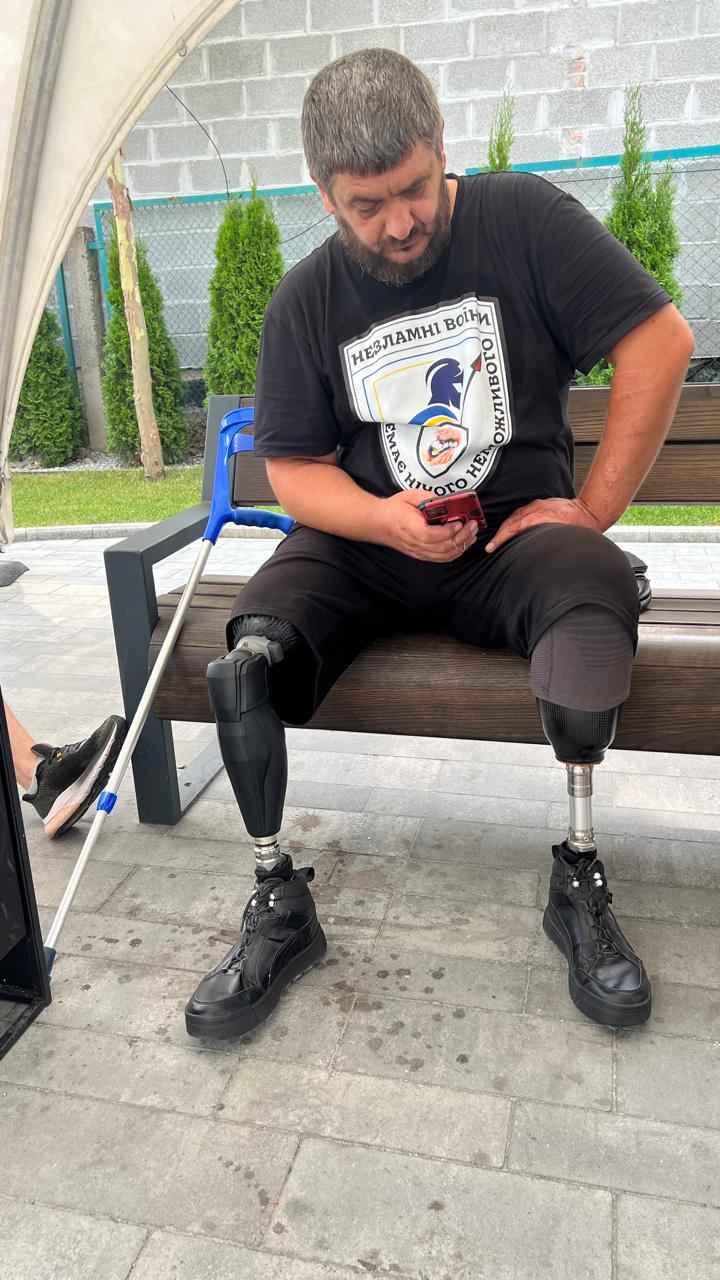 That’s Petro Buryak. His car was blown by a landmine in the front line. You can read his interview on my social media.
That’s Petro Buryak. His car was blown by a landmine in the front line. You can read his interview on my social media.
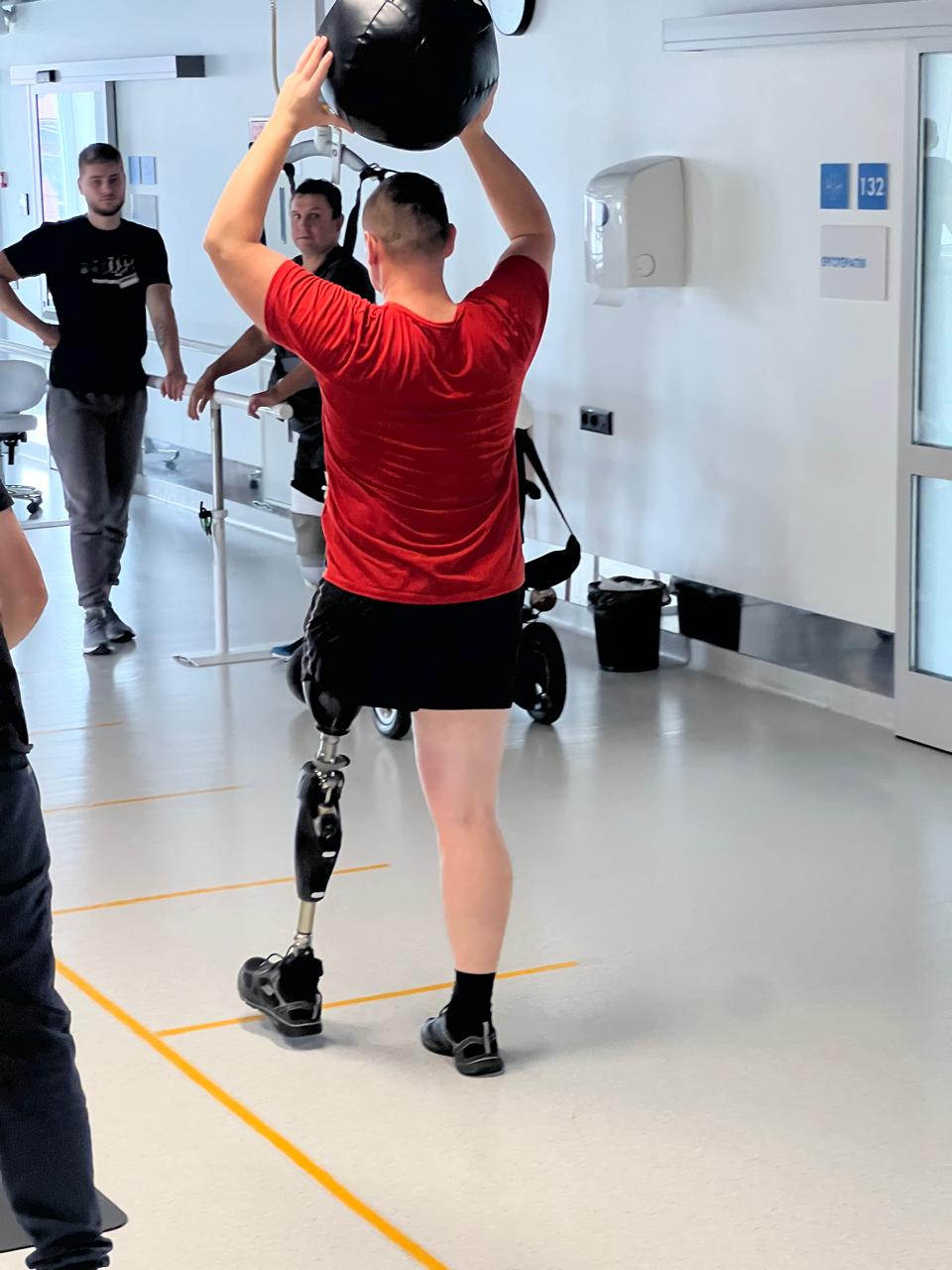
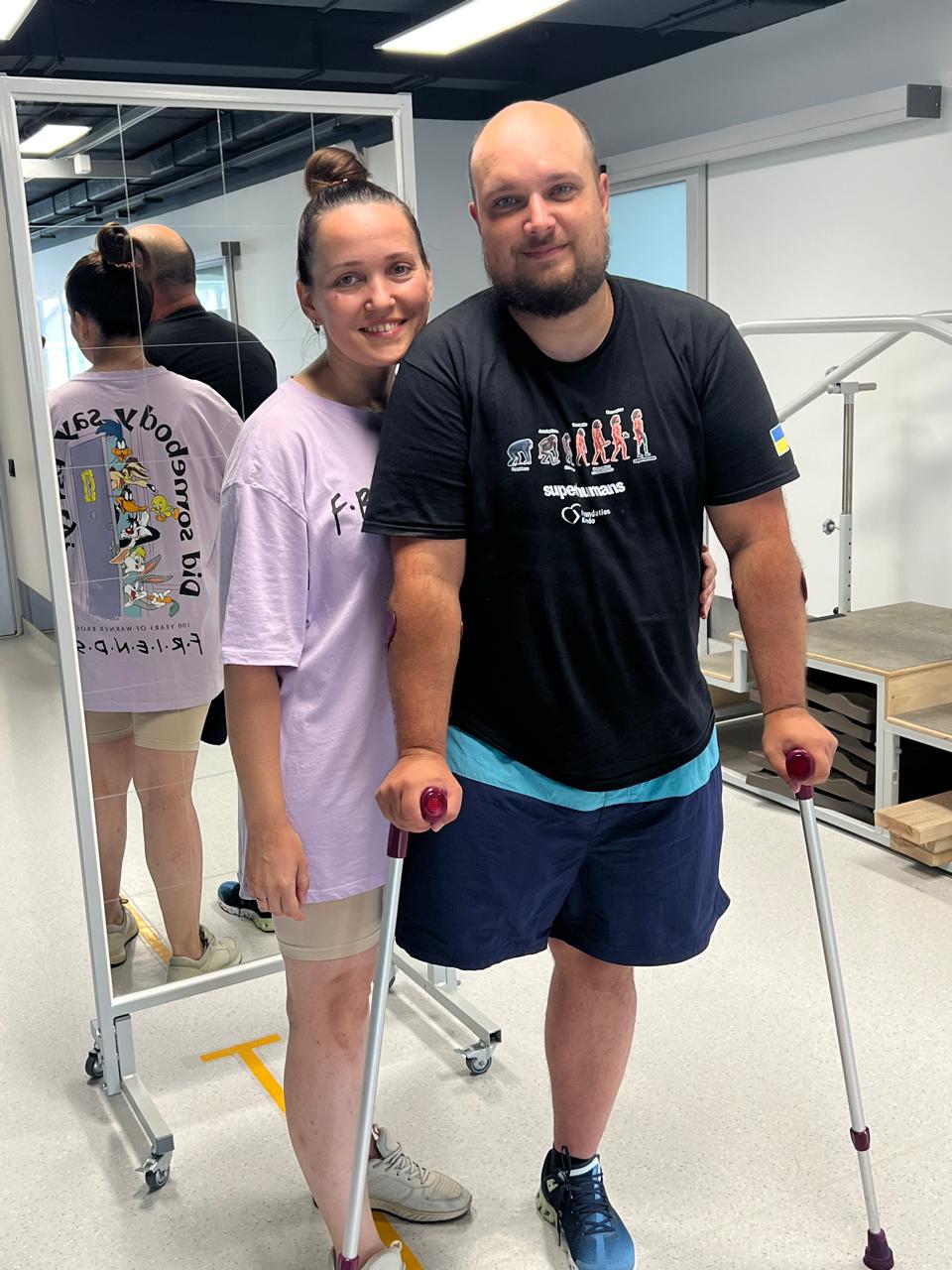 We had lunch somewhere really nice. We have been eating in some decent places. There are lots of bread and salads for starters, exotic meals. Breakfasts in the hotel, on the other hand, should be categorised under war crimes. Cold cuts, bread that can be used as a scalpel, and sausages that taste like old curtains.
There was a meeting with Maksym Kozytskyi, the head of Lviv Regional Military Administration. The newsy journalists from other African countries engaged him. I sat there wondering if Tamms was still mad at me. I remembered something she told me one day: “I can’t wait to turn 18 so that I can have my freedom and go out.” I laughed loudly, genuinely. I said, “Oh you will be so bored of it you won’t go anywhere.”
That made me smile.
There was a planned tour of the city at night but I skipped it. I was too wiped. Also, groups tire me: Moving in groups. Doing things in groups. Talking in groups. Besides, I couldn’t wait to go back to the room and read. I’m reading Erasure, by Percival Everett. Fantastic prose.
We had lunch somewhere really nice. We have been eating in some decent places. There are lots of bread and salads for starters, exotic meals. Breakfasts in the hotel, on the other hand, should be categorised under war crimes. Cold cuts, bread that can be used as a scalpel, and sausages that taste like old curtains.
There was a meeting with Maksym Kozytskyi, the head of Lviv Regional Military Administration. The newsy journalists from other African countries engaged him. I sat there wondering if Tamms was still mad at me. I remembered something she told me one day: “I can’t wait to turn 18 so that I can have my freedom and go out.” I laughed loudly, genuinely. I said, “Oh you will be so bored of it you won’t go anywhere.”
That made me smile.
There was a planned tour of the city at night but I skipped it. I was too wiped. Also, groups tire me: Moving in groups. Doing things in groups. Talking in groups. Besides, I couldn’t wait to go back to the room and read. I’m reading Erasure, by Percival Everett. Fantastic prose.
 My room had a bathtub. I thought, rather preciously, that I’d try soaking in there with a book like I see people do in movies after a long hard day in the trenches. (Excuse that pun). So I filled the tub slipped in with my book and tried to read. I was distracted though; The tub kept making gurgling sounds. Second, I was afraid my Kindle would accidentally fall into the water. And how the hell do women read in the bathtub? I started getting weak in there, tired. Like the water was draining me. So I quit and went to bed and prayed there would be no air raid siren at night.
DAY THREE.
Kyiv.
My room had a bathtub. I thought, rather preciously, that I’d try soaking in there with a book like I see people do in movies after a long hard day in the trenches. (Excuse that pun). So I filled the tub slipped in with my book and tried to read. I was distracted though; The tub kept making gurgling sounds. Second, I was afraid my Kindle would accidentally fall into the water. And how the hell do women read in the bathtub? I started getting weak in there, tired. Like the water was draining me. So I quit and went to bed and prayed there would be no air raid siren at night.
DAY THREE.
Kyiv.
 We drove about six hours North Central of Ukraine. It rained the whole way. Kyiv is a surprise. It’s modern. It’s vibrant. It’s a typical European city; No sign of war or an “uneasy calm,” someone mentioned. Russia’s assault on power grids and transmission lines in the last couple of months has plunged the city into daily blackouts for up to 12 hours. We didn’t experience the blackouts, though.
We spent the whole day in some interviews with academics and bureaucrats. We toured the city, crossing streets at right angles. Saw destroyed Russian military hardware from the first invasion in 2022. I touched the snout of a tank, the mouth of death, the messenger of evil.
Took some dope photos.
We drove about six hours North Central of Ukraine. It rained the whole way. Kyiv is a surprise. It’s modern. It’s vibrant. It’s a typical European city; No sign of war or an “uneasy calm,” someone mentioned. Russia’s assault on power grids and transmission lines in the last couple of months has plunged the city into daily blackouts for up to 12 hours. We didn’t experience the blackouts, though.
We spent the whole day in some interviews with academics and bureaucrats. We toured the city, crossing streets at right angles. Saw destroyed Russian military hardware from the first invasion in 2022. I touched the snout of a tank, the mouth of death, the messenger of evil.
Took some dope photos.
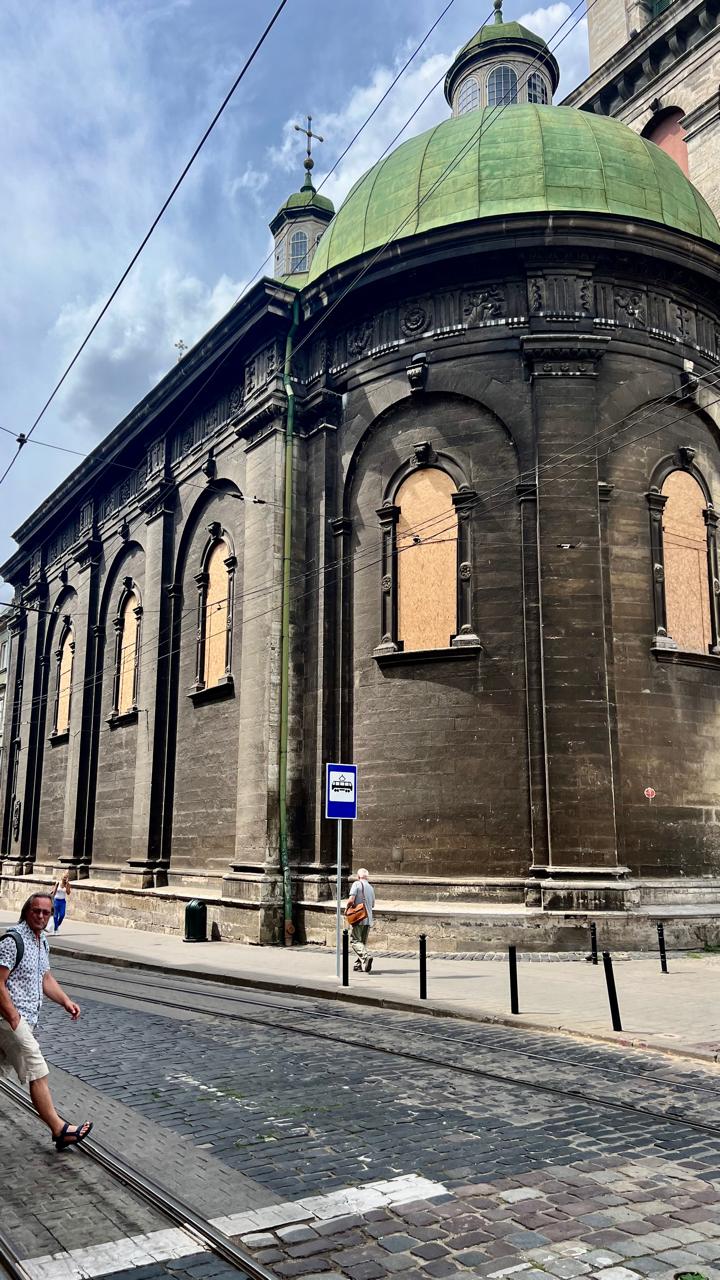
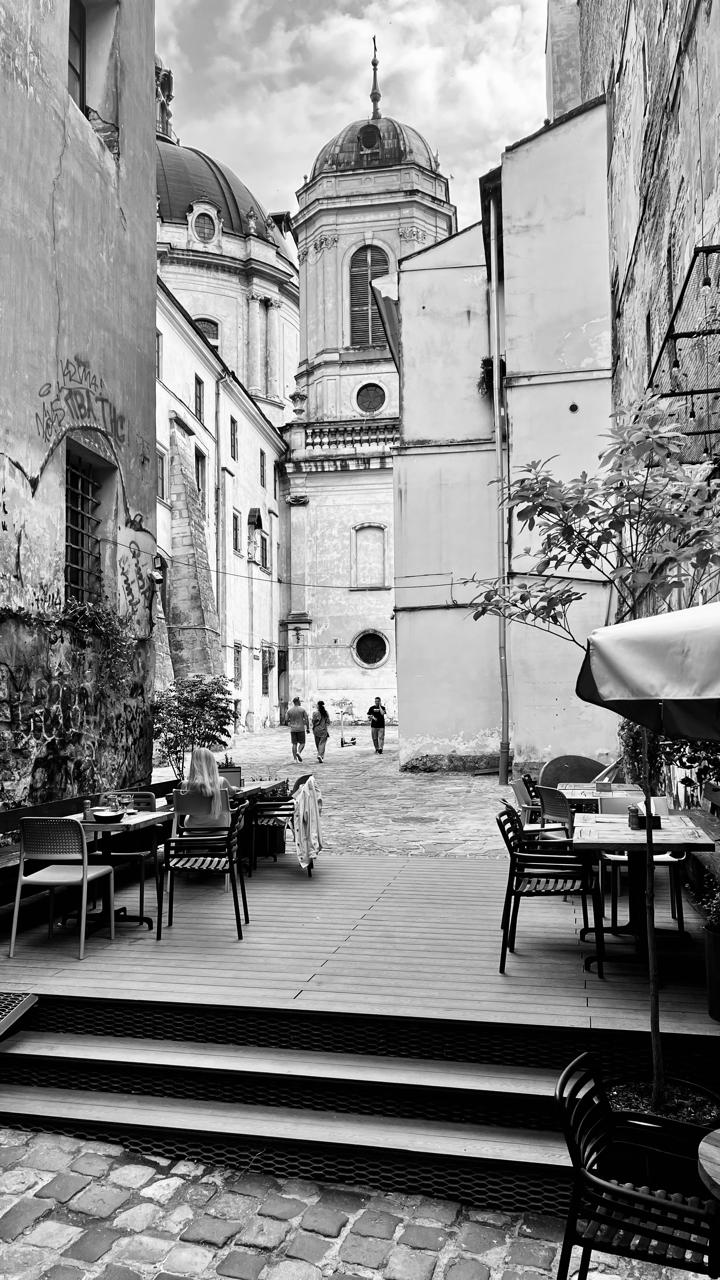
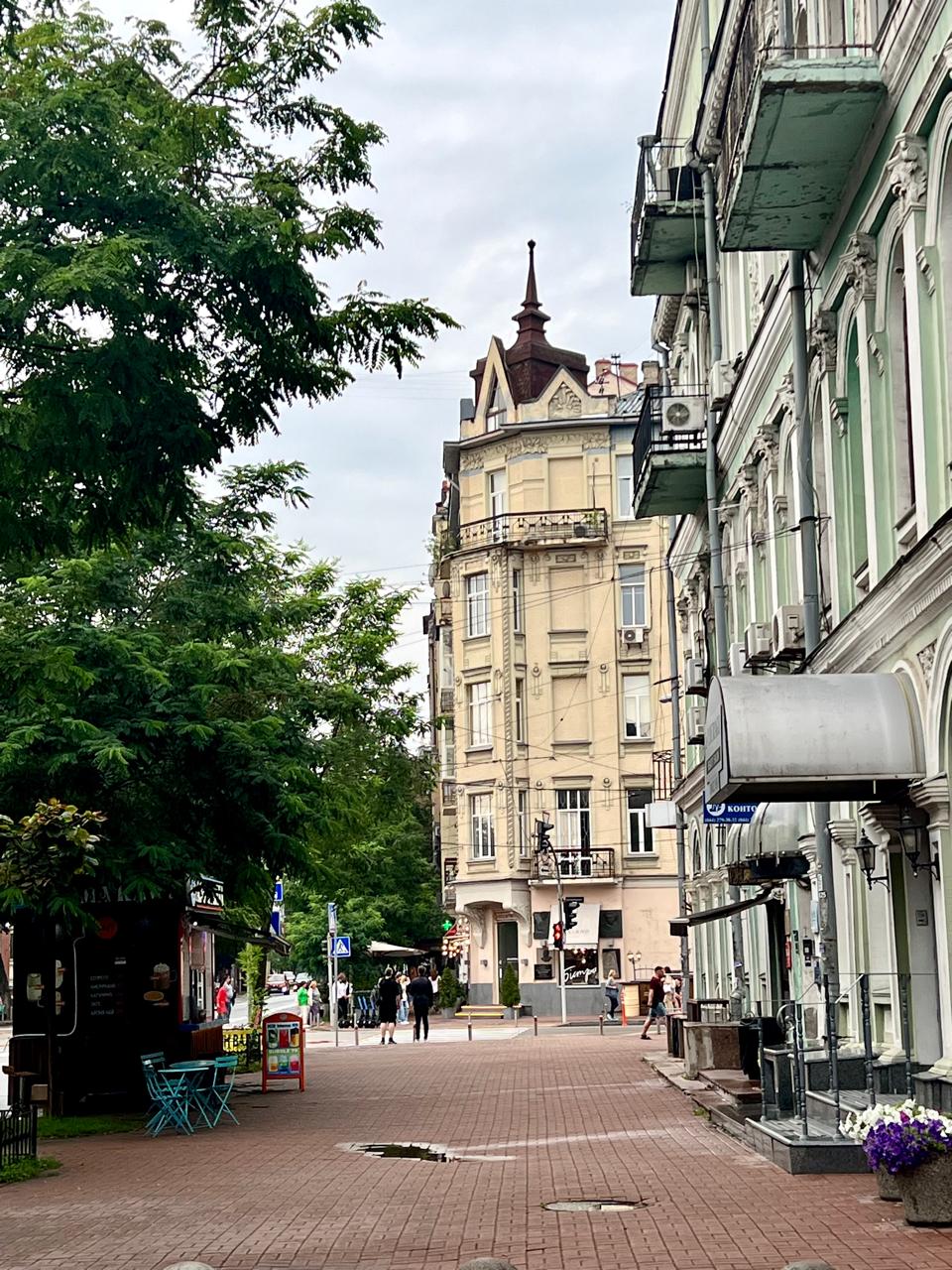
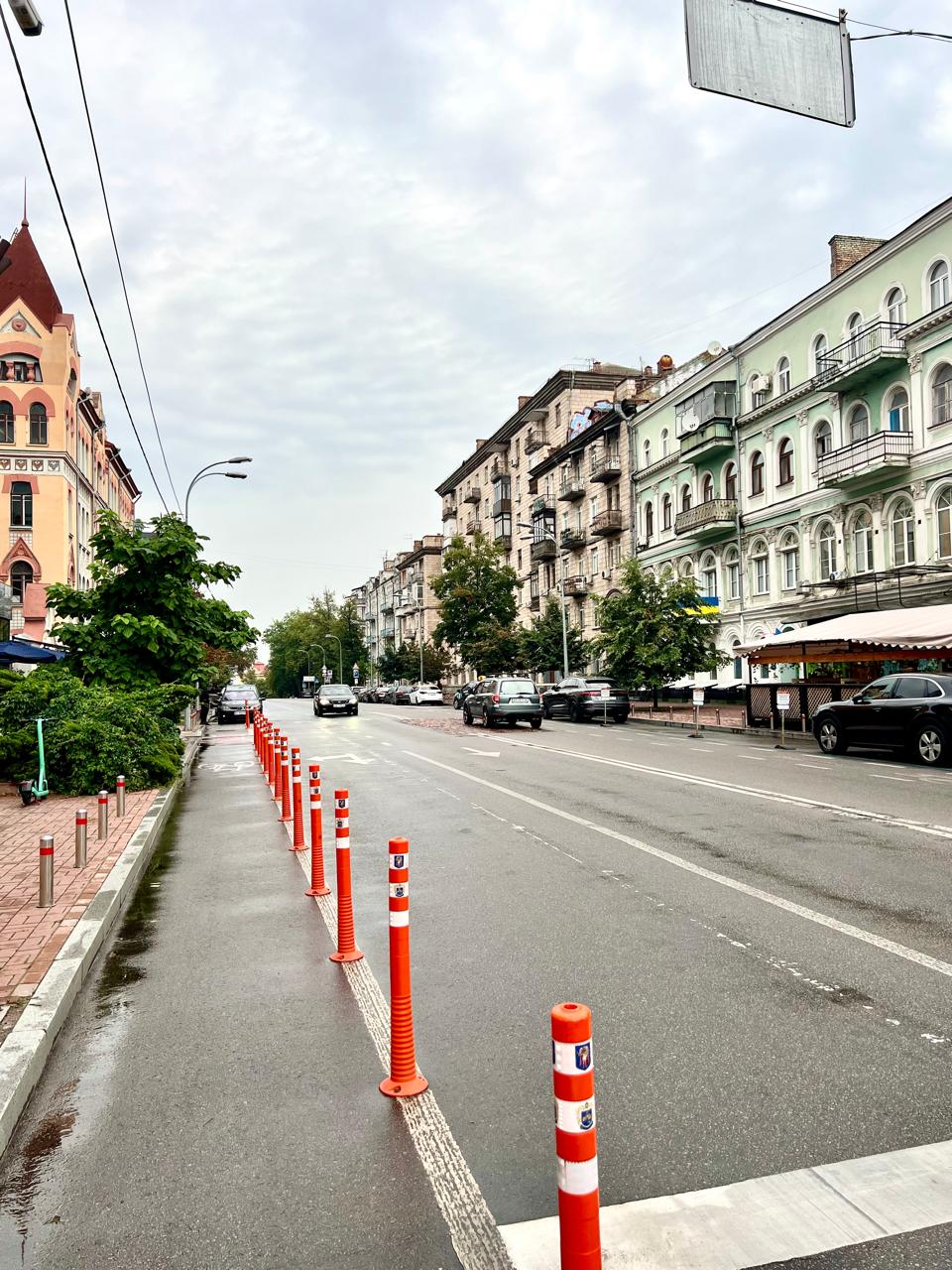
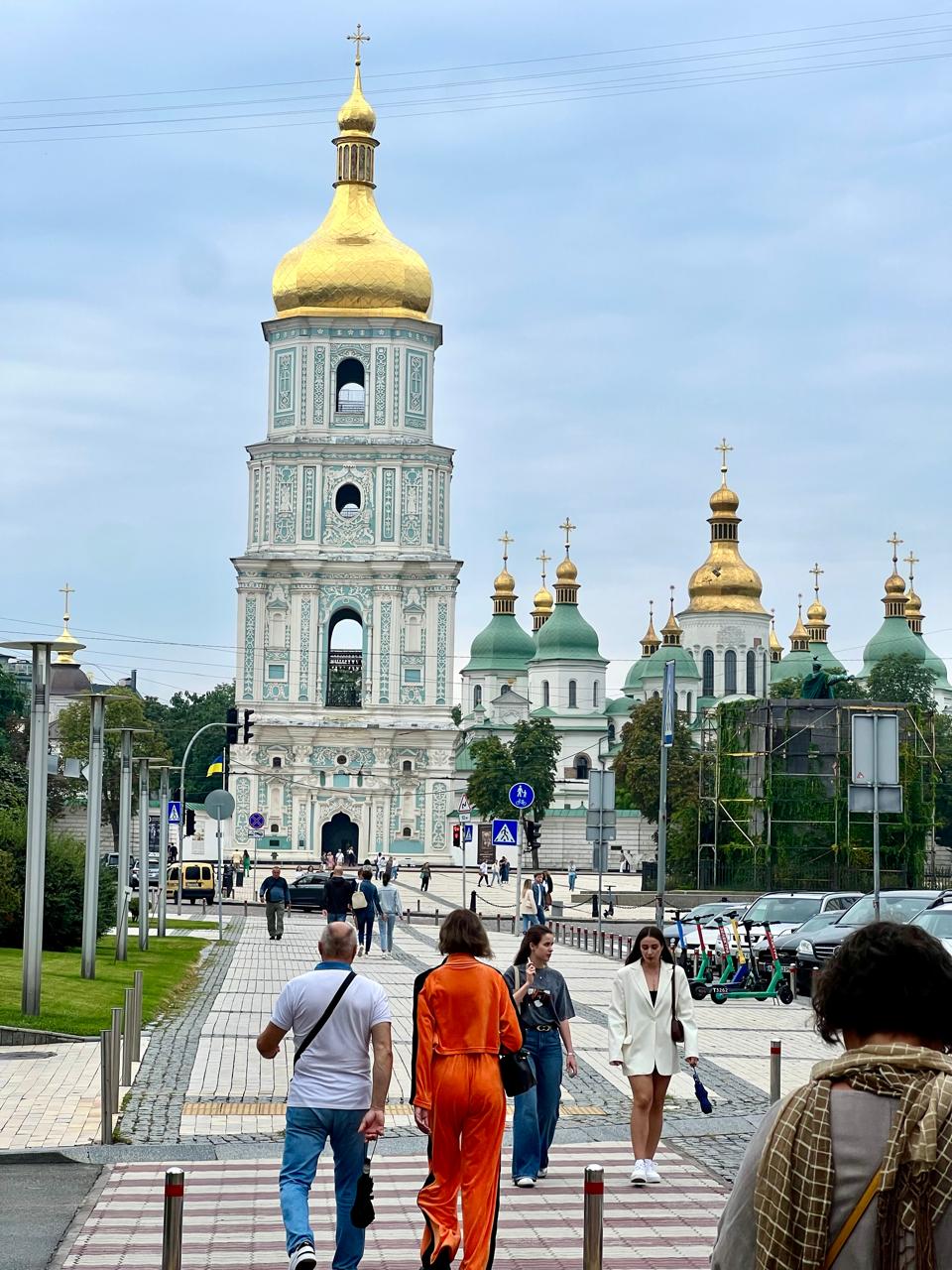
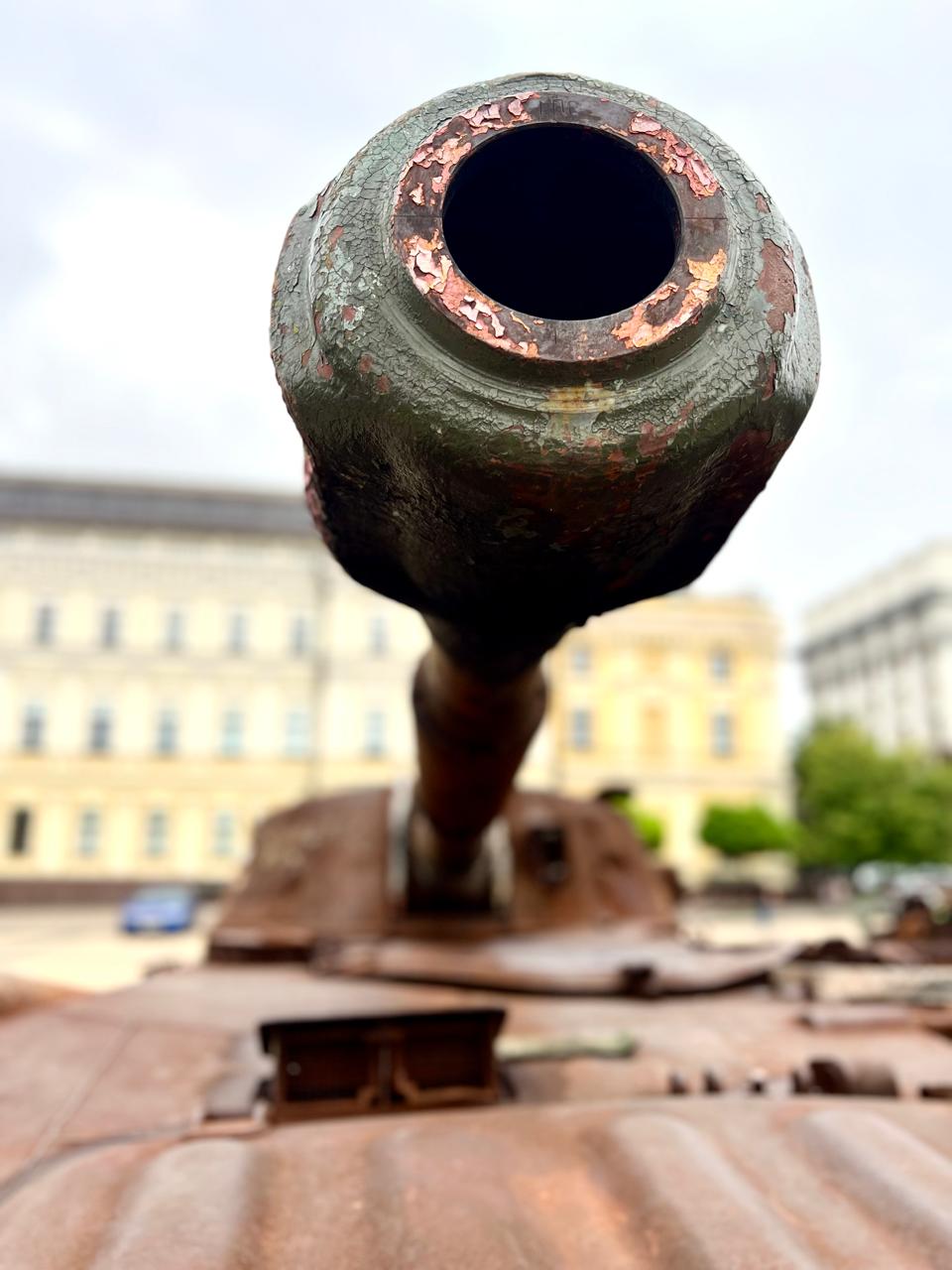 DAY FOUR.
Tamms texted me to say she was off to school. The text was as warm as a Russian’s heart.
We drove to Moschun.
You might have heard of the Battle of Moschun. It has been described as one of the fiercest and most important battles during the defense of Kyiv when the Russians first invaded Ukraine in March 2022. If the Russians took Moschun, they would then take Kyiv in a matter of hours. So the Kremlin sent one of his most elite fighters with their most modern equipment.
DAY FOUR.
Tamms texted me to say she was off to school. The text was as warm as a Russian’s heart.
We drove to Moschun.
You might have heard of the Battle of Moschun. It has been described as one of the fiercest and most important battles during the defense of Kyiv when the Russians first invaded Ukraine in March 2022. If the Russians took Moschun, they would then take Kyiv in a matter of hours. So the Kremlin sent one of his most elite fighters with their most modern equipment.
 They met great resistance that they hadn’t anticipated. First, they couldn’t cross the River Irpin because a dam called Kozorovitsky had been blown by Ukrainian National Guards and special forces creating a natural barrier. They had also shown up with outdated maps, so when they got to Moshchun they were like, “Nikolai, this map says right here that there would be a road here.”
“There was. There is. I…what map is this you got, Boris?”
“The map we were given, what do you mean?!”
“But here it says this map is from 1944!”
“Are you kidding me?”
Meanwhile, the whole village of Boshchun led by the man whose picture you see here, the mayor of Moschun, was out in the streets, turning street signages to confuse the Russians. Children and women were out digging trenches and making Molotov bombs. The small village of 1,500 people was out defending their turf. The fight lasted a month before the Russians retreated.
They met great resistance that they hadn’t anticipated. First, they couldn’t cross the River Irpin because a dam called Kozorovitsky had been blown by Ukrainian National Guards and special forces creating a natural barrier. They had also shown up with outdated maps, so when they got to Moshchun they were like, “Nikolai, this map says right here that there would be a road here.”
“There was. There is. I…what map is this you got, Boris?”
“The map we were given, what do you mean?!”
“But here it says this map is from 1944!”
“Are you kidding me?”
Meanwhile, the whole village of Boshchun led by the man whose picture you see here, the mayor of Moschun, was out in the streets, turning street signages to confuse the Russians. Children and women were out digging trenches and making Molotov bombs. The small village of 1,500 people was out defending their turf. The fight lasted a month before the Russians retreated.
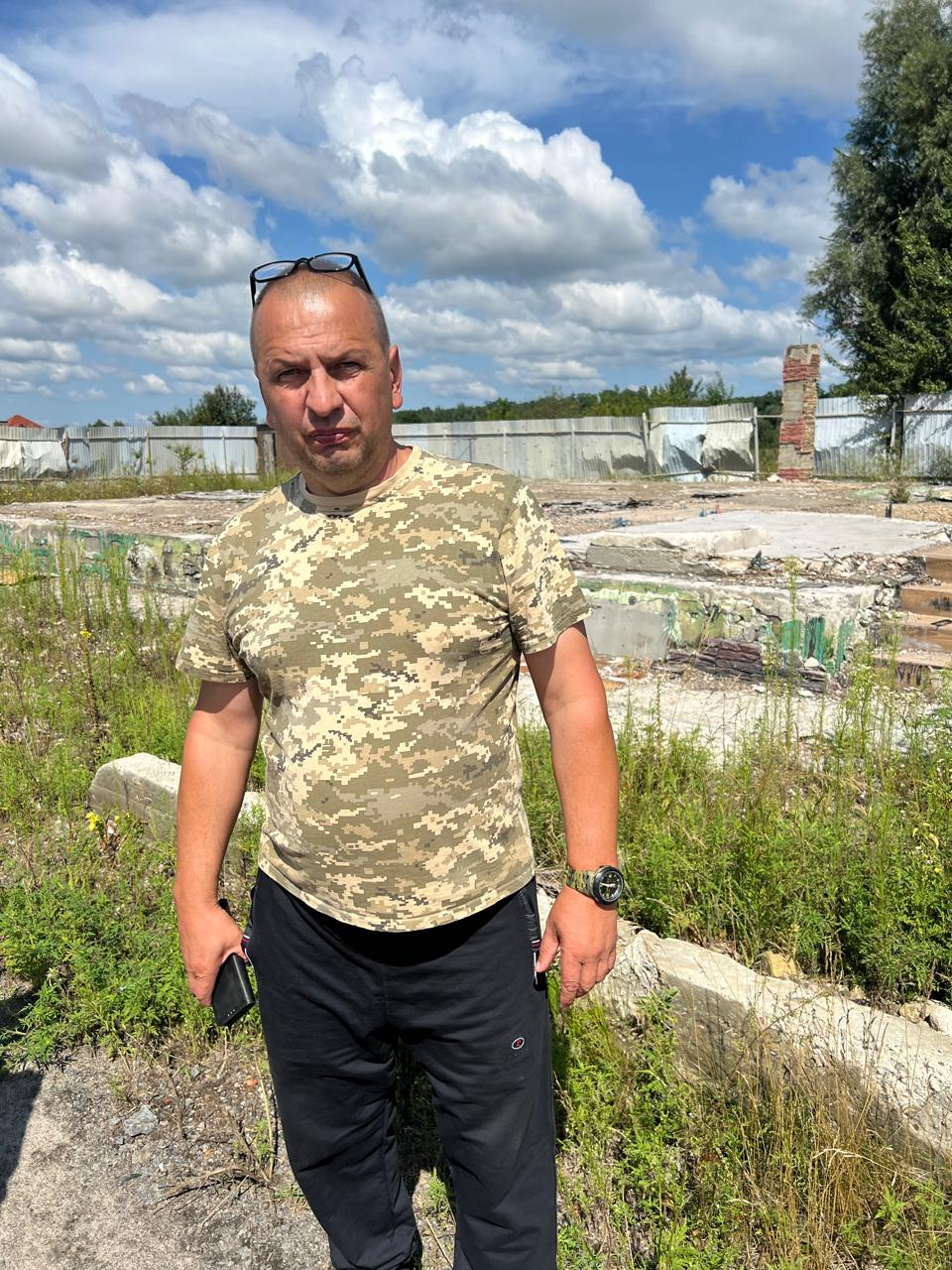 The Mayor of Moschun, who once fought for the soviet army in the Balkans when his country was still under the soviet union, says whenever he hears choppers now, he gets scared. “I can’t sleep the whole night when I hear the sound of choppers.” His two sons are out fighting on the front lines. I asked him if that made him anxious, that they might not come back home. “Are there other sons of other men in this war who might not come home?” he posed. “Imagine if all we thought about was the safety of our sons? We can’t let those selfish thoughts take over us. We have to think about the country before anything else.”
“I get it. I get all that. ” I told the translator, “but ask him if he is still scared for them.”
She said something to him in Ukrainian. He looked towards the woods and growled like a bear before he said something brief.
“He says fear is not something he thinks about now.” She said, and he started walking.
We went to Bucha, a city in Kyiv Oblast where Russians committed tortures and mass murders of 458 Ukrainians. They call it the Bucha Massacre. They rolled into the city in their tanks, plundering, torturing, killing, and leaving bodies in the streets for dogs to eat. Ugliness. There is a church, The Church of the Holy Apostle Andrew the First, a memorial of the victims of the invasion. There, behind the church, was a mass grave, now exhumed and reburied properly. We met Olena, one of the visitors, reading the names on the massive plaque crying uncontrollably. She was with her daughter and husband. They’d fled to the UK and were visiting her motherland. She couldn’t stop crying. “All these people, killed.” She wept.
DAY FIVE.
I woke up at 4 am this morning to find a missed call from – Orrin – one of the South African journalists on this trip. Yesterday there was a serious air alert shortly after midnight and explosions thereafter. The rest of the team had to rush down to the hotel’s underground bomb shelter.
I slept through all that.
I never heard the call, the air siren, or the explosions. I’m nursing a sore throat so I had taken some antihistamine and blacked out early, intending to wake up at dawn to write.
I could have died in my sleep.
What if I did? What if this is the afterlife in a continuum? What if you – the reader – are not even real?
What is this life?
Anyway, I have to go and have cold ham for breakfast.
Hotel food truly is atrocious the world over.
Talk soon, long day ahead.
This was scribbled in a frantic flurry while battling a tube of toothpaste, tripping over my feet and praying that I don’t get scolded by a stout Ukrainian.
The Mayor of Moschun, who once fought for the soviet army in the Balkans when his country was still under the soviet union, says whenever he hears choppers now, he gets scared. “I can’t sleep the whole night when I hear the sound of choppers.” His two sons are out fighting on the front lines. I asked him if that made him anxious, that they might not come back home. “Are there other sons of other men in this war who might not come home?” he posed. “Imagine if all we thought about was the safety of our sons? We can’t let those selfish thoughts take over us. We have to think about the country before anything else.”
“I get it. I get all that. ” I told the translator, “but ask him if he is still scared for them.”
She said something to him in Ukrainian. He looked towards the woods and growled like a bear before he said something brief.
“He says fear is not something he thinks about now.” She said, and he started walking.
We went to Bucha, a city in Kyiv Oblast where Russians committed tortures and mass murders of 458 Ukrainians. They call it the Bucha Massacre. They rolled into the city in their tanks, plundering, torturing, killing, and leaving bodies in the streets for dogs to eat. Ugliness. There is a church, The Church of the Holy Apostle Andrew the First, a memorial of the victims of the invasion. There, behind the church, was a mass grave, now exhumed and reburied properly. We met Olena, one of the visitors, reading the names on the massive plaque crying uncontrollably. She was with her daughter and husband. They’d fled to the UK and were visiting her motherland. She couldn’t stop crying. “All these people, killed.” She wept.
DAY FIVE.
I woke up at 4 am this morning to find a missed call from – Orrin – one of the South African journalists on this trip. Yesterday there was a serious air alert shortly after midnight and explosions thereafter. The rest of the team had to rush down to the hotel’s underground bomb shelter.
I slept through all that.
I never heard the call, the air siren, or the explosions. I’m nursing a sore throat so I had taken some antihistamine and blacked out early, intending to wake up at dawn to write.
I could have died in my sleep.
What if I did? What if this is the afterlife in a continuum? What if you – the reader – are not even real?
What is this life?
Anyway, I have to go and have cold ham for breakfast.
Hotel food truly is atrocious the world over.
Talk soon, long day ahead.
This was scribbled in a frantic flurry while battling a tube of toothpaste, tripping over my feet and praying that I don’t get scolded by a stout Ukrainian.
Discover more from Bikozulu
Subscribe to get the latest posts sent to your email.

Stay safe Biko….
Interesting read. Keep safe. I did my undergraduate in a small town in Russia called Nizhny Novgorod, similar architecture and general vibe, your photos have brought back memories.
True, there is great resemblance to Russia. I was in the south of Russia, in a small town Taganrog.
Why? In a world with approximately 195 countries, why did you pick Russia for your undergrad?
Thanks for sharing this experience. Brings some odd perspective to the ongoing conflict.
You have a way with words. So beautifully written can’t wait for the follow up .
You really do have an eye for photography….
Such a lovely piece! Thank you for allowing us to see the part of that country that we rarely get to see. Quite brave of you to travel there.
I just have to laugh that you slept through a whole emergency situation! Maybe it was the universe protecting you from extreme fear that prevents you from enjoying the rest of your trip. I hope all is well and you come back safe.
Stay Safe.. Gives a different perspective to what I think of war..
Time numbs concern, or at least the passage of it.
I remember in early 2022, the concern my small circle of people and the Kenyan twitter in general bore for Ukraine was nearly tangible.
All united against Putin’s excesses, sharing videos of Ukrainians bravely teaching each other how to make Molotov cocktails, priding ourselves in the wake of Ambassador Martin Kimani’s tough address to the UNSC, many having the Ukrainian flag on their headers and as extensions to their usernames.
But time. Slowly, we cared littler, or could be the effect of our high tempo politicking it being an election year.
Biko’s narration relieves the pain and hatred we shared for Putin then, the praise we had for Zelenzsky in those early days, the president who wore only T-shirts and rallied his people against an aggressor
And now, that part of me is re-wakened.
May Ukraine prevail.
Be safe Chocolate Man.
Cheers, I won’t congratulate your writing. I need to be unique Biko!
stay safe Biko
Thanks for this beautiful perspective! May God keep you safe! Tamms needs you for the tiffs… I think you need the tiffs as well. And we need these stories…
Biko,unaweza nipea through pass to those svelte women?
A very nice read
This had me reminiscing of my recent travel to Berlin. I lost a kilo missing ugali and feeding on that bread for two weeks.
Also, Tamms is my spirit animal with her warm Russian heart..
The readers would still follow you in the afterlife Keep safe, Biko
ati what if we ain’t real?
Stay safe Biko!
stay safe, Biko
Are you guys there to create a narrative?
How do you know the taste of old curtains?
Biko,Stay safe.
Wow! great, evocative read! war is hell.
Also, great award winning pics.
Towards the end of last summer I was in Poland for some school thing and when I told my dad he was like, “People are running away from the war, but keep going closer to it, hehe. I say the same words to you, Biko, haha. Stay safe!
Biko, be safe out there
Interesting and informative read..
And you do take great photos.
Do take care.
Thanks! I will.
I absolutely love all your articles, and I keep laughing, sleeping through explosions is crazy, anyway, can’t wait for the follow up
How do I say this, have you ever planned to call someone but they call you first as you beginning to dail their number. I was just sharing my thoughts on some issues and wrote an article I titled “What is this life for sure?”. It was triggered by the suffering of the people of Sudan mostly those from the Dafur Region. I touched on the Israel and Palestine conflict then this Russian invasion of Ukraine. I should just share the article, let me get a link.
Funny how a thriving African country is pale in comparison to a war-torn European country. Ruto must go! err, my bad, that was an intrusive thought.
had to Google “Eva Mendes”, no comment!
This is really a great read Biko. Glad you came back in one piece.
Where did you taste old curtains?
Brilliantly written as ever. And the pictures!
Quite an interesting read. I follow the happenings in Ukraine very keenly